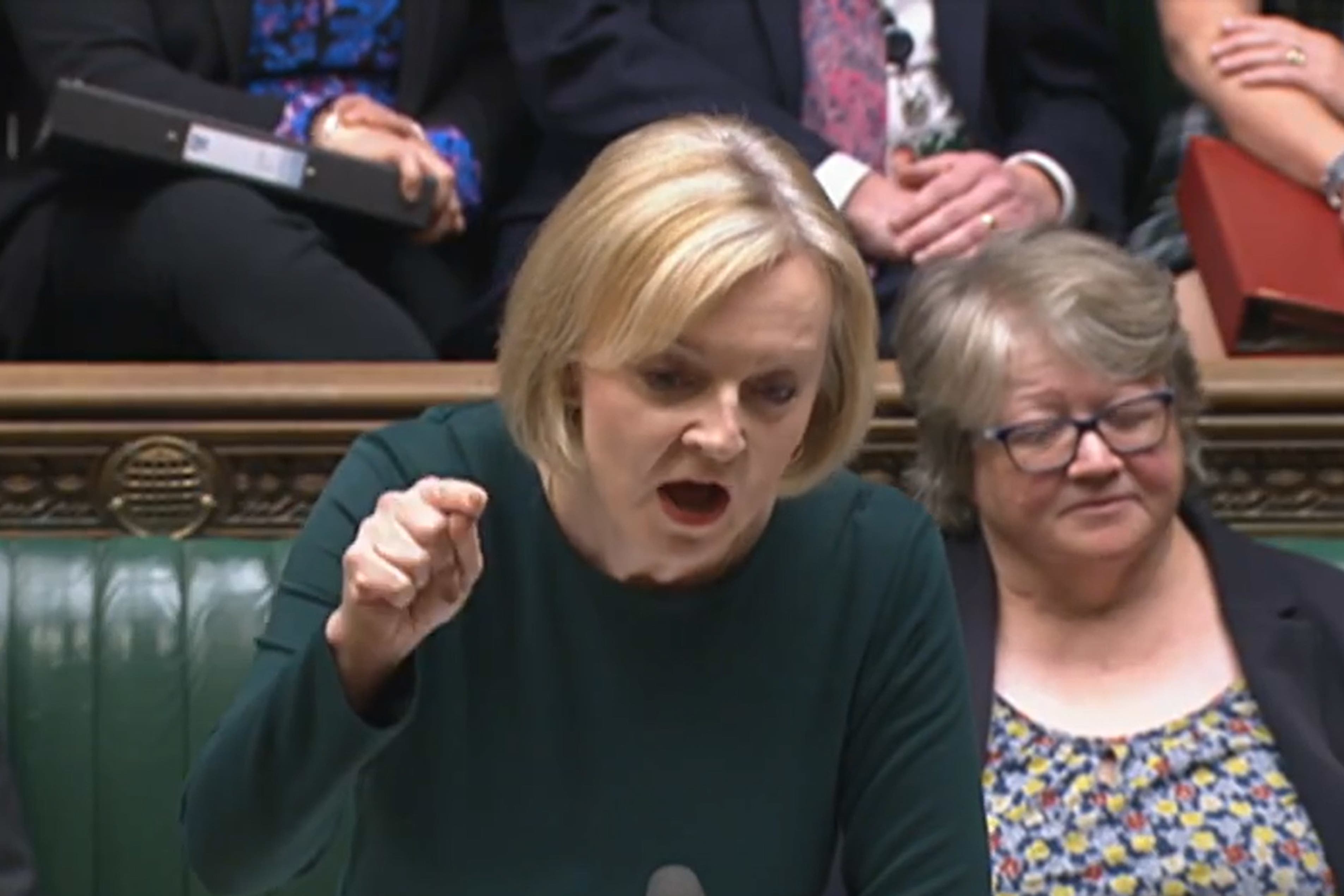Liz Truss faces growing pressure to rip up tax-slashing plans
The Prime Minister was accused of ‘trashing’ Conservative values as a bid to win over mutinous MPs backfired.

Your support helps us to tell the story
From reproductive rights to climate change to Big Tech, The Independent is on the ground when the story is developing. Whether it's investigating the financials of Elon Musk's pro-Trump PAC or producing our latest documentary, 'The A Word', which shines a light on the American women fighting for reproductive rights, we know how important it is to parse out the facts from the messaging.
At such a critical moment in US history, we need reporters on the ground. Your donation allows us to keep sending journalists to speak to both sides of the story.
The Independent is trusted by Americans across the entire political spectrum. And unlike many other quality news outlets, we choose not to lock Americans out of our reporting and analysis with paywalls. We believe quality journalism should be available to everyone, paid for by those who can afford it.
Your support makes all the difference.Liz Truss was under fire from her own MPs as they demanded more U-turns on her tax-slashing agenda after she ruled out spending cuts to balance the books.
The Prime Minister’s leadership was in renewed peril as she was accused of “trashing the last 10 years” of the Tories’ record at a bruising meeting with backbenchers.
MPs piled pressure on her to restore market confidence in her Government, with reports suggesting she is facing mounting calls to reverse or delay her plan to cancel a rise in corporation tax from 19% to 25%, due in April.
Ms Truss has insisted this and other tax cuts will boost growth, but the so-far unfunded measures in Chancellor Kwasi Kwarteng’s mini-budget have sparked chaos in the financial markets.
Mel Stride, the Tory chairman of the Commons Treasury Committee, said that given Ms Truss’s commitments to protect public spending, there was a question over whether any plan that did not include “at least some element of further row back” on the £43 billion tax-slashing package can reassure investors.
“Credibility might now be swinging towards evidence of a clear change in tack rather than just coming up with other measures that try to square the fiscal circle,” Mr Stride said.
Conservative former minister David Davis called the mini-budget a “maxi-shambles” and suggested reversing some of the tax cuts would allow Ms Truss and Mr Kwarteng to avert leadership challenges for a few months.
“If they do that I think people like Mel Stride and others will come in behind them and they buy some time,” he told ITV’s Peston.
One of the obvious ways would be possibly to defer some of the tax cuts or the failure to put taxes up
Damian Green, a former deputy prime minister, said Conservative MPs are openly discussing reversing some of the mini-budget measures, as they question how else she can reduce debt after she rejected public spending reductions.
“It is indeed a topic of conversation around the tea rooms of the House of Commons as well, because we can all do the rough maths and see that it’s very difficult,” he told BBC Radio 4’s PM programme.
“One of the obvious ways would be possibly to defer some of the tax cuts or the failure to put taxes up.”
As MPs openly discussed the prospect of ousting the Prime Minister, an attempt to win over mutinous MPs at a meeting of the Tory backbench 1922 Committee on Wednesday evening failed.
Addressing the group, Ms Truss said small businesses would have faced “devastation” if the Government had not acted to cap energy prices, according to aides.
But she was met with open criticism, with MPs reportedly raising concerns about soaring mortgage rates and the Tories’ slump in the polls.
Commons education committee chair Robert Halfon told Ms Truss she had “trashed the last 10 years of workers’ Conservatism”.
The Prime Minister and Chancellor are expected to meet with critical MPs from next week to try to assure them that Mr Kwarteng’s medium-term fiscal plan on October 31 will address their concerns.
But Jacob Rees-Mogg suggested the Government could ignore Office for Budget Responsibility forecasts accompanying the strategy if they predict low growth and rising debt.
The Business Secretary told ITV’s Peston that “its record of forecasting accurately hasn’t been enormously good” and that the Chancellor could draw on “other sources of information”.
Earlier on Wednesday, Ms Truss insisted during her second Prime Minister’s Questions that she was “absolutely” not planning public spending cuts, but insisted taxpayers’ money will be used well.
But the remarks failed to prevent another day of economic turbulence which saw a rise in the cost of Government borrowing and the pound fall against the euro and dollar.
Since Mr Kwarteng’s September 23 mini-budget, the value of sterling has fluctuated and yields on government bonds, the cost of state borrowing, rose to such an extent that the Bank of England was forced to intervene to prevent problems for pension funds.
Ms Truss was also warned by senior advisers that it was “no longer credible” to press ahead with large tax cuts without risking a financial crisis, The Times newspaper reported.
She has already abandoned plans to cut the 45p rate of income tax for top earners.
Economists have suggested that restoring confidence in the Government’s grip on the national finances will require tens of billions of pounds’ worth of spending cuts or tax rises.